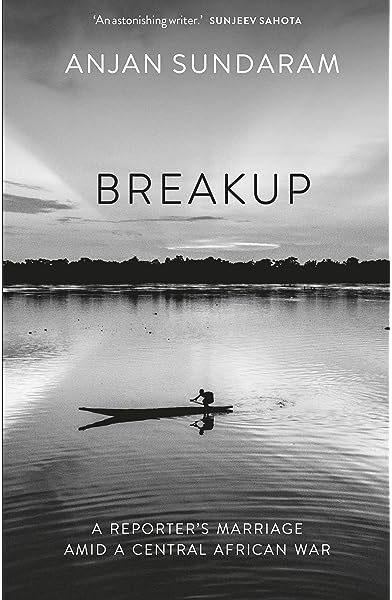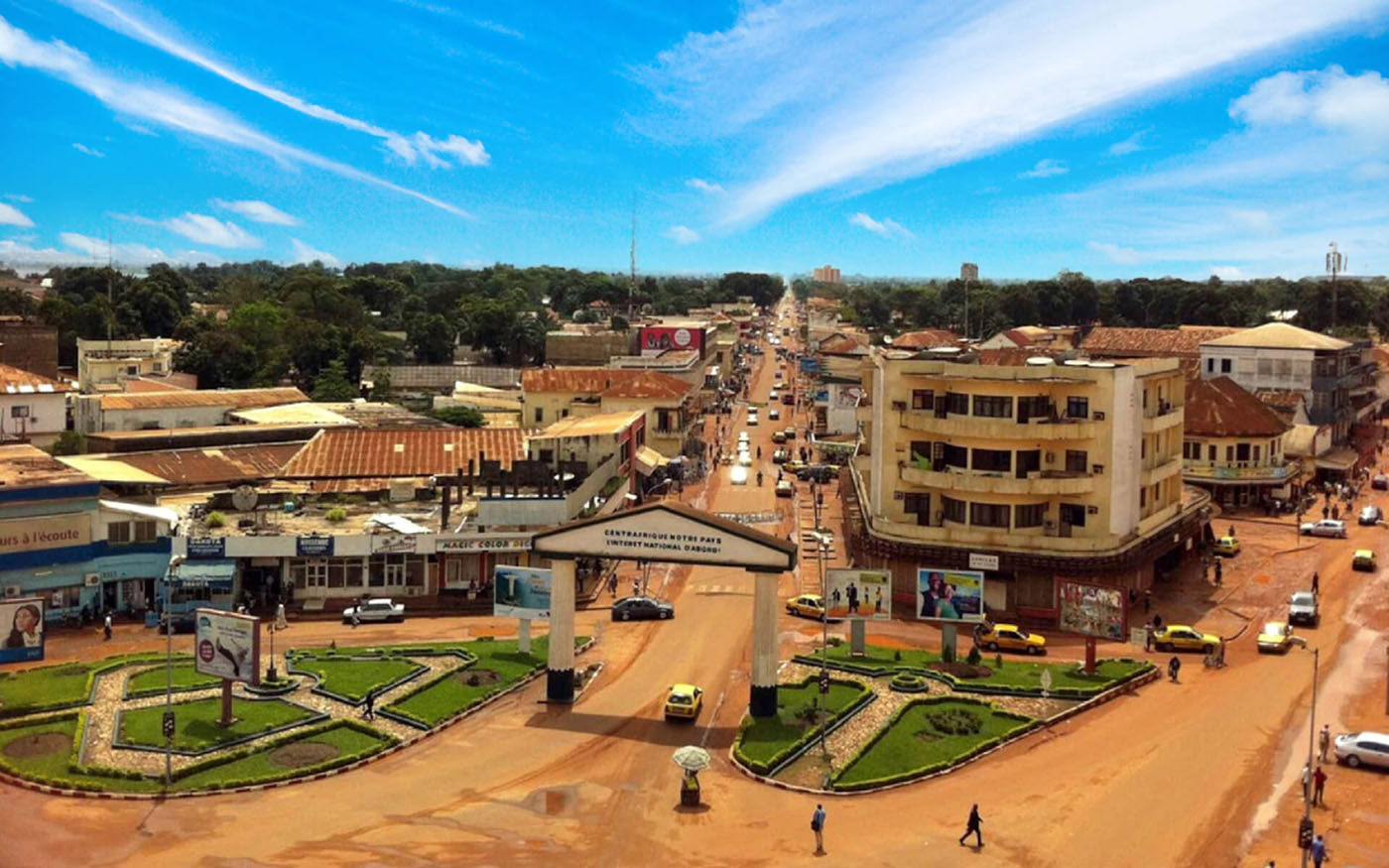After ten years reporting from central Africa, Anjan Sundaram is living a quiet life in Canada with his wife and newborn. But when preparations for genocide emerge in the Central African Republic, he is torn between his duty to his family and his moral responsibility to expose the conflict.
Breakup: A Reporter’s Marriage Amid a Central African War, by Anjan Sundaram
Hurst Publishing 2023
ISBN 9781805260202
Antony Loewenstein
The Central African Republic (CAR) is mostly ignored in the mainstream media, but in sparse depictions it’s often portrayed as a faraway nation bedeviled by an endless and bloody war over valuable natural resources including gold, timber and diamonds. Add Western media apathy and ingrained journalistic racism towards Africans and it’s unsurprising that most people don’t have a clue what’s happening in CAR.

“For years I had heard about this country,” writes journalist Anjan Sundaram in his startling new book, Breakup: A Reporter’s Marriage Amid a Central African War. He points out that foreigners may have heard of CAR through the “infamous” Lord’s Resistance Army, a brutal Christian rebel group that operates across CAR, Uganda, the Democratic Republic of Congo (DRC), and South Sudan.
The group, which had launched a rebellion in Uganda, “sought shelter in its [CAR’s] forests as US soldiers hunted it down.” Otherwise, “[the Central African Republic] made the news when power shifted and even then, hardly. From the outside, it could seem like an oblivion, a country in the high seas.”
Sundaram’s descent into hell across landlocked CAR is narrated against the backdrop of his crumbling marriage while his wife, Nat, is in Canada with their young daughter, Raphaelle. He travels around CAR with a Human Rights Watch researcher, Lewis Mudge, telling the reader that together they’re a more effective team because they are “recording the emotions of the war” and “gathering testimony of people’s courage.”
What transpires is a journey through an apocalyptic, battle-scarred landscape where, due to the perilous security situation, even local citizens have no idea what’s happening in their vicinity. Fear is etched on the faces of every civilian whom Sundaram and Mudge meet.
Sundaram isn’t a war junkie, endlessly drawn to documenting conflict, but his disarming gentleness masks a determination to uncover what most Western reporters don’t because there’s little glory in publicity or accolades in doing so.
CAR’s divisions principally occur along religious lines. Since becoming independent from France in 1960, the nation has rarely seen peace. In the past decade, the Muslim population has often been targeted, abused, and ethnically cleansed by Christian militias, but Sundaram is no apologist for the Muslim rebels and exposes a litany of their horrors, too.
CAR has been wracked by violence for years. The army is present in various parts of the country and stands accused of war crimes. The Muslim rebel coalition, known as the Seleka, topped President Francois Bozize in a coup in 2013 and has targeted the country’s Christians ever since. Millions of civilians have been displaced due to years of fighting. The resulting arc of instability extends beyond CAR to encompass Rwanda and the DRC (with Rwandan forces increasingly playing a major role in assisting the CAR government). All sides in CAR have committed war crimes, and accountability remains mostly out of reach.
Early in his book, Sundaram describes the Muslim rebellion in CAR as having “historical importance.” He adds:
This war marked a reversal of colonial history in Central Africa. A rare reversal, despite the ayatollahs, caliphates and militias. The rebels who had taken over the country were mostly Muslim. And their victory marked the first Muslim rule here since Muslim kingdoms were defeated by French armies in the late nineteenth century. Almost a hundred years after the French established their brutal African colonies, Muslims still remembered their ancestors’ humiliation, and sought to recover glory.
Thrust into this combustible sectarian divide is the real risk of worsening religious conflict. “Of Christians rising up to fight their new Muslims,” details Sundaram, “of old grievances resurfacing, of an implicit and long-unchallenged Christian dominance at stake.” And there’s something else. “This land was also rich with gold, diamonds, and the ivory of forest elephants.”
The violence is ongoing. Nine Chinese nationals were murdered in March in an attack near a goldmine outside CAR’s capital, Bangui. Deadly attacks against UN peacekeepers are common. A July 30th constitutional referendum that will allow current President Faustin-Archange Touadera to serve more than two terms has heightened tensions. Human Rights Watch has expressed concern that the space for civil dissent is shrinking due to police crackdowns on critics.
These days, if CAR does appear in the Western mainstream media, it’s often viewed as a state that no longer needs or wants American largesse. A long report in the New York Times in December 2022 detailed Russian influence, and alleged that CAR had become a “vassal state” of the Kremlin, with Moscow’s mercenary army, the Wagner Group, accused by the paper and human rights organizations of committing hideous abuses against the civilian population. More Wagner mercenaries arrived in CAR just before the late July referendum.
Moscow started providing weapons to CAR in 2017, when Putin hoped to secure access to the state’s vast natural resources. Today, Wagner’s pillaging in CAR is helping fund Russia’s war against Ukraine.
For many Western editors, black on black violence is inveterate. For Western consumers, it is confusing and irrelevant. It is the rare journalist who dedicates years of his or her life to offer an alternative worldview, showing the richness, complexity, beauty, and pain of the 54 African nations.
Across three compelling books, Sundaram has etched out a unique place in modern writing on Africa. This Indian-born journalist and television host left a management consulting job with McKinsey in San Francisco in 2009 and instead dedicated himself to reporting.
In his first book, Stringer (2013), Sundaram documented the challenges of being a freelancer in the DRC while conjuring a poignant evocation of a nation that much of the West still wants to exploit.
His second book, Bad News: Last Journalists in a Dictatorship, was released in 2016 and revealed the brutal nature of the Western-backed Rwandan President, Paul Kagame. It also detailed Sundaram’s courageous efforts to train local journalists despite the huge risks for everyone involved.
In key parts of Bad News, the author riffs on themes that characterize all his work. He stresses that many in the international community continually praise Kagame as a respected leader who deserves admiration. Sundaram rightly condemns the Western diplomats in Rwanda who remain silent in the face of growing attacks against free speech in the country:
The embassies had decided that helping the population to speak would hamper their relations with the President. “If we mention the repression to the government it will throw us out,” an official said. “And then we won’t be able to help anyone in the country.”
It was not the first time that the world had supported repression in Rwanda. As Sundaram details, the previous regime, whose rule had culminated in genocide, “had received similar praise, money and assistance from Western countries, which turned a blind eye to its crimes.”
Sundaram continues his examination of war and peace in Africa with Breakup. Near the beginning, he laments the familiar response from editors in the West when he’s pitching stories. “‘Which central African republic?’” they asked.” The war’s obscurity was galling for Sundaram. Despite its great tumult, its many killings, and its historical importance, Sundaram found that few had any interest in what was occurring in CAR or why. He recently told Democracy Now! that the world’s deadliest conflicts remain unreported.
Setting off from the country’s capital, Bangui, Sundaram and Mudge begin hearing stories about a recent, unreported government-led massacre that killed over 100 people in the town of Gaga, around 250 miles away.
“Has it been reported already?” Sundaram asks a local contact. “How come I’ve never heard of it?” He is told that journalists didn’t dare broadcast the news. “The government denied that its soldiers committed any crimes at all; and the journalists knew it was dangerous to report such a massacre.”
With evidence of mass crimes and threats of genocide against CAR’s Muslim population, Sundaram and Mudge place themselves in the middle of a conflict to bear witness. It’s noble work, yet Sundaram rightly interrogates the personal costs associated with it, namely being away from his family in Canada and risking his life on multiple occasions while in CAR.
One key passage in Breakup details what Sundaram faces during his reporting. Kidnapped by rebels and held at gunpoint, a commander tells Sundaram, Mudge and their local driver Yusuf that Western lies lay at the heart of its military policy.
“The U.S. used a children’s vaccination program as a cover to capture Osama Bin Laden,” he said. “That was a crime,” Sundaram responds. “But was anyone punished for it?” the commander asks. “The UN has sent French soldiers here to defend our murderous government. But our people are punished. No one can protect us except ourselves.”
It’s a striking moment because although these rebels undoubtedly committed grievous abuses, the commander’s argument was true.
The implication is clear, peppered throughout Breakup. Who are we in the West to preach about human rights in Africa when we never hold ourselves for account for countless invasions, occupations and killings? This Western hypocrisy partly explains why so many African countries now turn to Russia and China for support. Africa is still waiting for reparations, a full-throated apology, and acknowledgement of Western crimes that stretch back centuries.
Whose lives really matter to the so-called international community? Does the killing of black lives resonate in Western capitals, or do they prefer to arm and train Africans? In recent years, there have been at least seven coups by African soldiers who had been trained by American forces, yet there’s been no real change in Washington’s policies.
Nonetheless, one sign of hope is the Special Criminal Court in Bangui, which aims to address the gross violations of human rights in the country. It’s a small but necessary first step towards bringing the perpetrators of violence to account, and to giving some measure of closure to their long-suffering victims.
Although Breakup isn’t overly concerned with the minutiae of CAR politics, it rightly focuses on the vulnerable and the suffering in a war that most people have never heard of. For that reason alone, its author deserves praise and respect. Sundaram has ventured into a maelstrom at the potential cost of his most intimate relationships and even his life.





1 comment